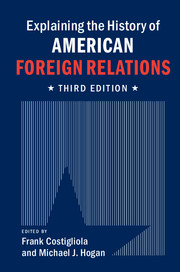Book contents
- Frontmatter
- Dedication
- Contents
- List of figures
- List of contributors
- Introduction
- 1 Theories of International Relations
- 2 National security
- 3 Corporatism: from the new era to the age of development
- 4 Explaining political economy
- 5 Diplomatic history after the big bang: using computational methods to explore the infinite archive
- 6 Development and technopolitics
- 7 Nonstate actors
- 8 Legal history as foreign relations history
- 9 Domestic politics
- 10 The global frontier: comparative history and the frontier-borderlands approach
- 11 Considering borders
- 12 The privilege of acting upon others: the middle eastern exception to anti-exceptionalist histories of the US and the world
- 13 Nationalism as an umbrella ideology
- 14 Nation Branding
- 15 Shades of sovereignty: racialized power, the United States and the world
- 16 Gendering American foreign relations
- 17 The religious turn in diplomatic history
- 18 Memory and the study of US foreign relations
- 19 The senses
- 20 Psychology
- 21 Reading for emotion
- Index
12 - The privilege of acting upon others: the middle eastern exception to anti-exceptionalist histories of the US and the world
Published online by Cambridge University Press: 05 March 2016
- Frontmatter
- Dedication
- Contents
- List of figures
- List of contributors
- Introduction
- 1 Theories of International Relations
- 2 National security
- 3 Corporatism: from the new era to the age of development
- 4 Explaining political economy
- 5 Diplomatic history after the big bang: using computational methods to explore the infinite archive
- 6 Development and technopolitics
- 7 Nonstate actors
- 8 Legal history as foreign relations history
- 9 Domestic politics
- 10 The global frontier: comparative history and the frontier-borderlands approach
- 11 Considering borders
- 12 The privilege of acting upon others: the middle eastern exception to anti-exceptionalist histories of the US and the world
- 13 Nationalism as an umbrella ideology
- 14 Nation Branding
- 15 Shades of sovereignty: racialized power, the United States and the world
- 16 Gendering American foreign relations
- 17 The religious turn in diplomatic history
- 18 Memory and the study of US foreign relations
- 19 The senses
- 20 Psychology
- 21 Reading for emotion
- Index
Summary
The name of the adolescent field of transnational inquiry “US and the World” suggests its own contradiction. The dyad of the United States and the world hints at a parity, and a distance, between the two terms. And yet the object of pairing the terms is to encourage an anti-exceptionalist historiography that presumably rejects the nationalist myths that remain central to how the United States officially represents itself: as a “leader” of the “free world,” as “democratic,” as not imperialist, and finally, as vastly superior to and different from every other political culture in the world. Who, then, is best positioned to understand the histories that have been made and unmade by American crossings and encroachments across the world, and the counter-crossings of the peoples, networks, and ideologies that have made their impact felt on America? The self-identified and professionally certified US historian, or historians of the rest of the world upon which and in which the United States has so massively been implicated? This chapter suggests that a deep historiographical imbalance remains between what has largely been accomplished in the transnational turn within US historiography, namely recognizing America's place in the world, and what has not been sufficiently done, namely connecting with, and thus delving into, the complex histories of this world on their own robust, and linguistically and historiographically varied, terrain.
The transnational and ostensibly anti-exceptionalist imperatives that have driven “US and the World” have already been much debated and discussed among US historians and indeed among scholars in the related field of American Studies. They have intersected quite readily with imperial and postcolonial historiography. They have built on a legacy of the critical study of US imperialism bequeathed to them by New Left scholarship that laid bare an imperialist capitalist American hegemony over the world, or what William Appleman Williams famously described as the “tragedy” of American diplomacy that made interventions across the world “a way of life.” Asking neglected historiographic questions (of culture and race in foreign policy studies, for example, or about the international circuits and networks in which Americans were routinely enmeshed), giving voice to the hitherto and historically marginalized groups (African Americans, Native Americans, Central and South Americans, Filipinos, immigrants including Asian-Americans, non-Americans, and so on), and pointing out the economic and political costs of empire have all been important parts of this frontal challenge on American historiographical nationalism.
- Type
- Chapter
- Information
- Explaining the History of American Foreign Relations , pp. 203 - 216Publisher: Cambridge University PressPrint publication year: 2016



